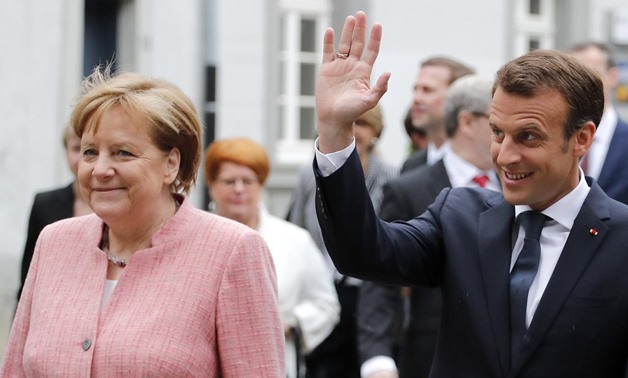
French President Emmanuel Macron waves next to German Chancellor Angela Merkel as he arrives to receive a Charlemagne Prize in Aachen, Germany May 10, 2018.
BERLIN/PARIS - 11 May 2018: France and Germany on Thursday urged Israel and Iran to exercise restraint and avoid further escalation of hostilities in the Middle East after the heaviest military exchange ever between the two regional adversaries.
Israel said it had attacked nearly all of Iran's military infrastructure in Syria, destroying dozens of sites, after Iranian forces fired rockets at Israeli-held territory for the first time.
German Chancellor Angela Merkel and French President Emmanuel Macron discussed the Iranian rocket attacks and Israel's response in Aachen, western Germany, and called for prudence and de-escalation.
"The escalations of the past few hours show us that it is truly about war and peace. And I can only call on all sides to exercise restraint here," Merkel said during a ceremony awarding Macron the Charlemagne Prize for strengthening EU integration.
Expectations of a flare-up in the Middle East were stoked by President Donald Trump's announcement on Tuesday that he was withdrawing the United States from the 2015 nuclear deal between Iran and world powers.
The Middle East was becoming very dangerous, said French Foreign Minister Jean-Yves Le Drian, adding that there was no 'Plan B' in response to Trump's move and that France wanted to keep the accord alive even without Washington on board.
"It is clear that last night's incidents are part of a new context in the Middle East, where what we feared happening is becoming reality: the Syrian and Iranian issues are becoming intertwined," Le Drian told BFM TV.
The Trump administration portrayed its rejection of that agreement as a response, in part, to Tehran's interventions in the Middle East, underpinning Israeli Prime Minister Benjamin Netanyahu's tough line towards Iran.
"LET'S FACE IT"
Merkel told Iran's President Hassan Rouhani in a telephone call on Thursday that she supported maintaining the nuclear accord as long as Tehran upholds its side of the deal. Macron told Rouhani the same a day earlier.
Germany, France and Britain want talks to be held in a broader format on Iran's ballistic missile programme and its regional activities - including in Syria and Yemen.
In her speech in Aachen, Merkel urged the European Union to strengthen its foreign and defence policy, arguing that Europe could no longer fully rely on the United States to protect it.
"Let's face it, Europe is still in its infancy with regard to the common foreign policy," she said. "And it will be existentially necessary to make progress here because the nature of conflicts has completely changed since the end of the Cold War."
Pointing to the civil war in Syria, Merkel said that many of the global conflicts today were flaring on the doorstep of Europe.
"And it is no longer the case that the United States of America will simply protect us. Instead, Europe has to take its destiny into its own hands. That is the task for the future."
Macron echoed the call to flesh out Europe's common foreign and defence policy. "We made the choice to build peace in the Middle East. Other powers ... haven't kept their word," Macron said, without naming a country directly.
"We must succeed in building our own sovereignty, which in this region, will be the guarantor of stability," he said.


Comments
Leave a Comment